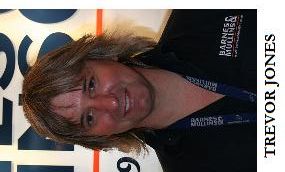Guitar Tech Trevor Jones Answers Your Questions (Part 2)
Welcome back to our new bi-monthly Guitar Tech column, this week featuring part II of Barnes & Mullins´
Trevor Jones'
answers to your axe-related questions...
Playing since he was 16, Trevor has over 30 years experience on guitar and was our first port of call for some home grown Guitar Tech talent.

Starting out as a session guitarist for EMI Studios, Trevor is a qualified mechanical engineer, woodcarver and electronics engineer, so he knows a thing or two about the workings of your favourite instrument.
For the past few years he´s been putting his skills to good use at Barnes & Mullins Ltd in Oswestry, teching for endorsees including The Enemy, Babyshambles and Cradle Of Filth.
If you have a question you would like answered e-mail us at TotalGuitar@futurenet.com and get your pesky axe problems sorted! In the meantime, here's Trevor´s second instalment…
Get the MusicRadar Newsletter
Want all the hottest music and gear news, reviews, deals, features and more, direct to your inbox? Sign up here.
--------
Hi Trevor,
I have a really bad ‘earthing´ problem with my Flying V. It makes this terrible buzz but stops when I touch anything metal. I´ve been told it´s an ‘earthing´ problem with my pickups because I´m very sure its not my input jack. Please help!
Cheers, Rory
Hi Rory,
Guitar electrics are really a matter for a qualified guitar tech. However, earthing is quite simple. Every electrical component in your guitar needs to be earthed. This means that the metal body of each component, for example a volume pot or a switch, needs to be connected to each other. Also, there should be a cable coming from the bridge or tailpiece, which also needs to be connected to earth. To test the earth resistance you will need a basic test meter. Put one lead on the earth side (outer coax) of the input socket and with the other lead touch the body of each component. The meter needs to show a good connection. It´s good to understand how it works, but I still recommend you entrust the job to a good guitar tech!
--------
Hi Trevor,
I have a few questions that I really need help with - I´m on the verge of desperation here! I recently bought a Dan Armstrong Plexiglass guitar for a cheap price because the switch in it was broken: easy enough to repair, I thought, buy a new switch, put it in and job done! Well, I have done that and I´m confused: the switch works fine, in the middle it cuts out the tone controls altogether, fine! If you flick the switch left or right, however, the tone controls do exactly the same thing! They work fine but I'm not sure that its supposed to have two positions where it just makes the guitar sound the same in both? Is there any specific switch that I should have bought?
Dan O, via email
Hi Dan,
It sounds to me like you have installed the wrong type of switch. You need to contact the manufacturer or main distributor. There are several types of switch used in guitar circuitry, there is the basic three-way toggle switch (typical on Les Paul type instruments) and there are other types including DPDT (double pole double throw) rotary switches, etc. And there are even more variations on how they can be wired. Any good musical instrument shop should have a guitar tech that can help you. If you´re unsure, take the original switch to the shop with you.
--------
Hello!
For the last few months I've been browsing music stores for a guitar to learn to play with. I've decided I want to build a cheap practice guitar to help me understand how to assemble guitars and to design/paint myself. I bought a cheap Les Paul-copy kit off eBay recently and I realised I don´t know much about guitar construction! I was wondering if you guys could fill me in a bit? I just want to know what kind of things to look for when building a DIY kit (or guitar in general), such as what kind of wood is better quality/produces better sound and what kind of paint or dye to use that won't ruin the wood?
Thanks, Michael
Hi Michael,
Building your own guitar is not always the best route to go down if you want to learn to play guitar. There are two very different learning processes going on here that don´t necessarily dovetail together. If your goal is to learn to play the guitar, then I recommend you buy a guitar and learn to play on it. However, if your goal is to build a guitar then I recommend you buy a good book on guitar building and read it several times before you attempt to build your own. Guitar building requires many different skills and a good grounding in basic musical instrument manufacture. I would imagine it would be rather difficult to make a good guitar without being able to play really well. Either way good luck and let us know how you get on!
--------
I have been playing for a year and a half now and I think it's time to get a new axe. I have had a look at a few different axes but what I really need is one that will fit my specifications. I need a good metal guitar priced around £300, with brutal low end and a great smooth lead sound as well. I use a lot of pinched harmonics in my songs so the guitar should be able to handle them easily! What do you recommend?
Mike, Manchester
Mike,
There are many guitars on the market at the moment that fit the bill! Ibanez make some fantastic guitars that meet all your requirements. You need to try a few and see which model suits you. Also, the Lag Arkane AM100 is a superb metal guitar. Pinched harmonics are really down to the set up of the guitar and a decent set of pickups. EMG pickups are the masters of pinched harmonics. Try a few guitars, tell the shop staff specifically what you are looking for and ask them if they can make sure the guitar is set up before you buy it.
--------
If you have a question for Trevor, send it here: TotalGuitar@futurenet.com
For more information on Trevor, and Barnes and Mullins Ltd visit his website HERE.

“Those arpeggios... That was the sickest thing I ever heard”: Yngwie Malmsteen on why guitarists should take inspiration from players of other instruments if they want to develop their own style

“I used a flange on the main riff and a wah-wah on the solo. I just said, ‘Hit the record button and I’ll let it rip!’”: Kiss legend Ace Frehley on his greatest cult classic song









